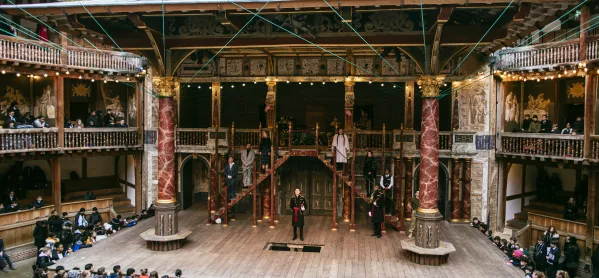Why the Globe is offering antiracist Shakespeare CPD

You can study the prose and verse, analyse the iambic pentameter and scrutinise the motifs - but nothing beats watching a Shakespeare play.
Capturing this magic is something that Lucy Cuthbertson, the new co-director of education at the Globe, wants for all school students - especially after the pandemic denied so many this opportunity for so long.
Cuthbertson and Farah Karim-Cooper took the reins as co-directors in June, and the pair are tasked with the challenge of reintroducing a generation of locked-down children to the Bard and ensuring his work remains as relevant, powerful and insightful as ever.
She explained to Tes why the Globe has created new CPD offerings to help teachers tackle Shakespeare through the lens of major social events, and described the challenge of bringing a trip to the theatre back to the school calendar.
WATCH: the Globe’s Lucy Cuthbertson answers four tough Shakespeare questions
With so much Shakespeare CPD out there, what CPD do you think teachers should be engaging with?
I’ve introduced a new CPD course on antiracist approaches to teaching Shakespeare.
It’s there to help teachers really think about how they address some of the issues that come up in the plays. And the plays are problematic - we can’t just skip over that or ignore them. Instead, we look at how you can have a proactive approach to engaging children with those ideas, and discuss which aspects of the play they want to criticise.
We don’t want to put everything [Shakespeare has written] on a pedestal. It’s important to allow young people to discuss: “This is racist. Why is this? And how do we address that?”
We’ve also put on a new CPD [course], Shakespeare and Women, where we look at women in the plays through a feminist lens.
We’re asking teachers to examine those characters and consider their portrayal. We look at ways you can help students when working on an interpretation of those characters where you move off the two-dimensional interpretation.
Why did you think it was important to introduce these courses?
I commissioned these new sessions to sit alongside our more generalised courses, as there was clearly a demand from teachers to be exploring the plays through a social justice lens - whether that’s race, gender, sexuality - and to focus on context in order to support their students to do the same.
Regarding our Teaching Anti-racist Shakespeare course, the events of last year made many people examine their own role in challenging racism and question all we do - and, as teachers, the curriculum we teach.
Racism exists in the plays - whether it is racist characters, situations, ideas - and teachers wanted to explore these issues with their students responsibly and confidently.
The same applies to our Shakespeare and Women course: the portrayal of gender and the female characters is of huge interest in teaching Shakespeare and can be a perfect way to engage young people with the characters, plot and language.
The majority of English teachers would have studied Shakespeare at degree level - why is it important to continue with CPD?
The world changes, we change, we learn more, new generations of students come through our schools asking different questions, bringing new perspectives.
Like teaching any part of the curriculum, as a teacher you have to develop and refine your approach in response to the students in front of you and the world around you.
The plays seem to be able to accommodate and adapt to all these changes by fundamentally saying “yes” to whatever well thought interpretation you want to bring to them. I have been working with Shakespeare for 30 years and I can’t ever imagine feeling remotely on top of it!
Children haven’t been able to watch live theatre in over a year - does that make your new role even more challenging?
The Globe has never been through such a difficult time. Prior to Covid we had a regular stream of schools always visiting and coming to education events, coming to the theatre. But it wasn’t always easy for all schools to get to the theatre.
I think it’s been such a tricky time for kids - everything has been so digital, and so online, and so isolated. And they haven’t had camaraderie, and they haven’t had interaction - they haven’t had live interaction.
I really hope the schools will be coming back to the Globe for their educational activities and to the theatre. [However,] I do think the challenges schools faced before the pandemic haven’t gone away - I think that, in some cases, they have worsened.
What makes watching Shakespeare so special?
These plays were plays. They were never made to be studied behind the desk. The plays were meant to be performed, not read. We have incredible English teachers in this country but nothing can quite match seeing an outstanding live production.
You need a Tes subscription to read this article
Subscribe now to read this article and get other subscriber-only content:
- Unlimited access to all Tes magazine content
- Exclusive subscriber-only stories
- Award-winning email newsletters
Already a subscriber? Log in
You need a subscription to read this article
Subscribe now to read this article and get other subscriber-only content, including:
- Unlimited access to all Tes magazine content
- Exclusive subscriber-only stories
- Award-winning email newsletters
topics in this article



